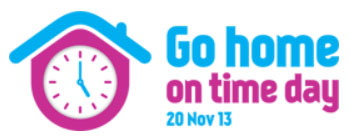Today is the fifth annual Go Home on Time Day, an initiative of The Australia Institute and beyondblue which aims to promote work-life balance and mentally healthy workplaces.
 Executive Director of The Australia Institute Dr Richard Denniss said it was exciting that more than 350 businesses and organisations have registered to participate and will be promoting the importance of work-life balance to employees.
Executive Director of The Australia Institute Dr Richard Denniss said it was exciting that more than 350 businesses and organisations have registered to participate and will be promoting the importance of work-life balance to employees.
CEO of beyondblue Ms Kate Carnell AO said that all the people our research shows don't take lunch or holiday breaks, and who are working increasingly long hours need to get out of the office on time today.
"It's wonderful people are committed to getting the job done, but when people are pushing themselves to meet deadlines and taking on extra work, their productivity and sense of wellbeing are likely to be affected," she said.
New research findings released today show that (the report can be downloaded below):
- 41 per cent of those surveyed aged 55 – 64 and 66 per cent of those aged over-65 said age discrimination was the main barrier to finding employment
- Workers aged 45 years and over were twice as likely as younger workers to be out of the workforce for more than two years.
Ms Carnell said in view of this, managers and business owners should think about tapping into that wealth of experience that is not being utilised.
"Giving consideration to employing older people, who may only want to work part-time, could be a cost-effective way to help lighten the load of those working harder and longer, and help make the workplace mentally healthy and improve productivity," she said.
Hard to get a break? report author Prue Cameron said: "Policy-makers often talk about the economic burden of an ageing population yet it is clear from our survey that many older workers want to work, but are ignored because they are considered too old. This has both a significant human and economic toll."
The research examines the experiences of the 'overworked' (those who would like to work fewer hours) and the 'underworked' (those struggling to enter the workforce or those who want to work more hours).
- Around 250,000 Australians are not working due to caring responsibilities, with four times as many women as men providing the care
- One in four employees checks work emails and answers work calls outside of work hours
- 3.8 million Australians routinely don't take a lunch break
- One in two Australian workers didn't take their full annual leave entitlements last year
- Unpaid overtime equates to $110 billion or 7.4 per cent of GDP
- The amount of unpaid overtime done by casual workers has increased fivefold since 2009
"The casualisation of the workforce clearly has Australian workers worried about their job security, so they're agreeing to do more unpaid hours because they think it will help them keep their job," Ms Cameron said.
Organisations which have registered to participate include Great Place to Work, NRMA, Murdoch University, Adobe, UnitingCare Australia and several unions including the ACTU, NTEU, ASU and Unions NSW.
"Go Home on Time Day is a light-hearted way to start important workplace conversations about a range of issues including work hours, leave, lunch breaks and how to manage stress," she said. "The aim of the day is to improve workplace culture in the longer term, rather than for just one day of the year."

